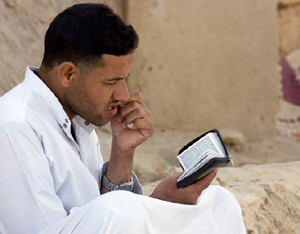 A young Egyptian studies the Koran, Islam’s holy book. Islam is not only Egypt’s dominant religion but also an all-embracing way of life. Egyptian Muslims comprise 90 percent of the nation’s more than 76 million people.
A young Egyptian studies the Koran, Islam’s holy book. Islam is not only Egypt’s dominant religion but also an all-embracing way of life. Egyptian Muslims comprise 90 percent of the nation’s more than 76 million people.Next time you think of Egypt, don’t think about King Tut and the pyramids. Instead, imagine you are:
– A university student, one of more than 2 million in Cairo alone. You’re intelligent and ambitious, but what’s the point of studying hard with so many graduates competing for so few career opportunities? So you hang out late in coffee shops with your friends. Last year you saw “The Passion of The Christ” when it played in local theaters. You’ve also heard about Jesus on satellite TV and the Internet. You want to know more, but whom do you ask?
– A Bedouin shepherd from the Sinai. Proud of your identity as a true Arab and “defender of Islam,” you’ve been pushed out of your tribe’s traditional desert home by development and tourism. Now you scrabble for a living in a grimy suburb on the edge of Alexandria. At night you look out into the silent desert, wondering if your children will ever return there.
– A Domari Gypsy woman, despised by most other Egyptians. So you hide your ethnic background, try to blend into society – and struggle to feed your children. Will anyone ever respect you for who you are?
– A Copt from Egypt’s age-old traditional Christian community. As a young man, you encountered Jesus personally and now follow him as Lord. You want to share him with others – even Muslims – but they often reject you. Even more painful: Your own family angrily denounces your vision for reaching beyond its ethnic enclave with the Good News. You struggle with discouragement, but the vision won’t die.
Modern Egyptians are proud of their 5,000-year-old culture. But Egypt is so much more than the remains of its past. It is a kaleidoscope of people loved by the Lord, and he wants them to know him.
As Isaiah prophesies, “The Lord Almighty will bless them, saying, ‘Blessed be Egypt my people'”(Isaiah 19:25a). He longs for them to experience his love and salvation through his son, Jesus Christ – who found sanctuary in Egypt from Herod’s wrath 2,000 years ago. Above all, the Lord is worthy of their worship and adoration.
That’s why the people of Egypt – all of them – are the focus of this year’s Day of Prayer and Fasting for World Evangelization set for June 4. On that day, Southern Baptists and other Great Commission Christians will focus on loving the people of Egypt through prayer, uniting their hearts and voices before God’s throne of grace.
Egyptian Muslims comprise the vast majority of the nation’s more than 76 million people. But the Copts, Egypt’s traditional Orthodox Christians, number at least 8 million – more than 10 percent of the national population. Millions of Bedouin, successors of the Arab conquerors who brought Islam to Egypt, still wander the desert. The Nubians and the Beja dwell in the south. The Berbers occupy the oases of the west. The Domari Gypsies (ethnic cousins to the Romani in Europe) live throughout Egypt.
“God is so full of passion for these people,” a Christian believer in Egypt says. “He so wants them to come to him. I picture in my mind a father who so desperately wants to hug his children that he gets down on the floor and puts out his arms – but they don’t want to come. They don’t know him.”
They never will, except through prayer:
– Pray that fear among Egyptian believers and seekers will be replaced by holy boldness.
– Pray for streams of God’s light to wash across Egypt’s ancient deserts of darkness.
– Pray that every believer will become a disciple-maker and that Egyptian followers of Jesus will unite to spread the gospel throughout every community.
Editor’s note: A free video/DVD is available from the IMB – “Blessed be Egypt: From Desert to Delta.” It contains multiple resources for use by churches, small groups and children. Visit ime.imb.org or call 1-800-999-3113.
Descendants of the ancient Egyptians, the Copts embraced Christianity during the early centuries of the church. At least 8 million strong, they remain the largest Christian minority in the Middle East. Many, however, believe they are assured of eternity with God because of their religious heritage, rather than salvation by faith.